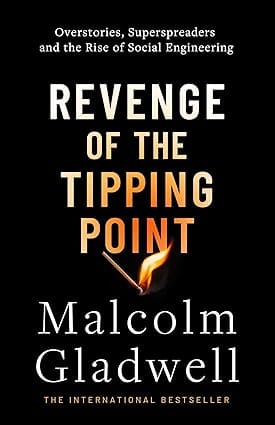-
Non-ficton
- Non-ficton
-
Contemporary Fiction
- Contemporary Fiction
-
Children
- Children
-
Comics & Graphic Novels
- Comics & Graphic Novels
-
Non-Fiction
- Non-Fiction
-
Fiction
- Fiction
Twenty-five years after the publication of his groundbreaking first book, Malcolm Gladwell returns with a brand new volume that reframes the lessons of The Tipping Point in a startling and revealing light
Why in the late 1980s and early '90s did Los Angeles become the bank robbery capital of the world? What is the Magic Third and what does it have to do with racial equity? What do big cats and clusters of teen suicides have in common? These are just some of the questions Malcolm Gladwell addresses in this new work, which revisits the phenomenon of epidemics and examines the ways in which we have learned to tinker with and shape the spread of ideas, viruses, and trends-sometimes with great success, sometimes with disastrous consequences.
Gladwell shows that-whether in neighbourhoods, schools, zoos, or conference rooms-today's epidemics are no longer singular occurrences, but turbocharged versions of their earlier counterparts and we are more tempted than ever to try and manipulate tipping points for their own ends. Yet these efforts often come at a cost, creating difficult tradeoffs and unexpected dilemmas . Above all we must recognise our responsibility - as individuals and as a society - to take tipping points seriously if we want to change the world for the better . With this thought-provoking new book , his most personal yet, Gladwell gives us the insights we need to meet these challenges in innovative ways .
Review
Positioning his theory of the superspreader within COVID-19 and the opioid epidemic, Gladwell deftly demonstrates how attention to statistics and data points can shape a business, school, or community. An astute and bracing appraisal of how cultures succeed or fail. Best-selling Gladwell's updating of the concepts in the book that made him famous will garner lively media coverage and reader interest ? Booklist
Book Description
- Home
- Non-Fiction
- Revenge of the Tipping Point: Overstories, Superspreaders and the Rise of Social Engineering
Revenge of the Tipping Point: Overstories, Superspreaders and the Rise of Social Engineering
SIZE GUIDE
- ISBN: 9780349147185
- Author: Malcolm Gladwell
- Publisher: Little, Brown
- Pages: 368
- Format: Hardback
- Release Date: 3 October 2024
Book Description
Twenty-five years after the publication of his groundbreaking first book, Malcolm Gladwell returns with a brand new volume that reframes the lessons of The Tipping Point in a startling and revealing light
Why in the late 1980s and early '90s did Los Angeles become the bank robbery capital of the world? What is the Magic Third and what does it have to do with racial equity? What do big cats and clusters of teen suicides have in common? These are just some of the questions Malcolm Gladwell addresses in this new work, which revisits the phenomenon of epidemics and examines the ways in which we have learned to tinker with and shape the spread of ideas, viruses, and trends-sometimes with great success, sometimes with disastrous consequences.
Gladwell shows that-whether in neighbourhoods, schools, zoos, or conference rooms-today's epidemics are no longer singular occurrences, but turbocharged versions of their earlier counterparts and we are more tempted than ever to try and manipulate tipping points for their own ends. Yet these efforts often come at a cost, creating difficult tradeoffs and unexpected dilemmas . Above all we must recognise our responsibility - as individuals and as a society - to take tipping points seriously if we want to change the world for the better . With this thought-provoking new book , his most personal yet, Gladwell gives us the insights we need to meet these challenges in innovative ways .
Review
Positioning his theory of the superspreader within COVID-19 and the opioid epidemic, Gladwell deftly demonstrates how attention to statistics and data points can shape a business, school, or community. An astute and bracing appraisal of how cultures succeed or fail. Best-selling Gladwell's updating of the concepts in the book that made him famous will garner lively media coverage and reader interest ? Booklist
Book Description
Related Books
User reviews
NEWSLETTER
Subscribe to get Email Updates!
Thanks for subscribing.
Your response has been recorded.

India's Iconic & Independent Book Store offering a vast selection of books across a variety of genres Since 1978.
"We Believe In The Power of Books" Our mission is to make books accessible to everyone, and to cultivate a culture of reading and learning. We strive to provide a wide range of books, from classic literature, sci-fi and fantasy, to graphic novels, biographies and self-help books, so that everyone can find something to read.
Whether you’re looking for your next great read, a gift for someone special, or just browsing, Midland is here to make your book-buying experience easy and enjoyable.
We are shipping pan India and across the world.
For Bulk Order / Corporate Gifting
 +91 9818282497 |
+91 9818282497 |  [email protected]
[email protected]
Click To Know More
INFORMATION
POLICIES
ACCOUNT
QUICK LINKS
ADDRESS
Shop No.20, Aurobindo Palace Market, Near Church, New Delhi














